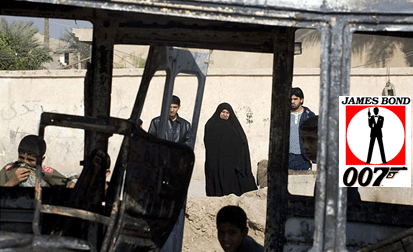
Iraqis with the remains of a minibus hit by a roadside bomb on Monday morning in Baghdad: Joao Silva for The New York Times
There are those decisive moments when something important or historic or even catastrophic happens. These are the things historians chronicle and poets bemoan. Then there is the universal act of killing time, the boring drudgery of day-to-day life but the kind of mundane routine we all long for after the unsought catastrophes. Thomas Friedman in a Saturday op-ed views the current economic crisis as a WMD dug up in our own backyard, a danger so potent that the January inaugural might be best moved up to Thanksgiving, killing two birds (a sacrificial turkey and a lame duck) with one bold act. President-elect Obama is hardly killing time, as his proposed cabinet appointees are press-conferenced to the nation in rapid-fire progression. Time in the larger sense is mercifully short, unless it stops completely in one of those mortality shocks that deadens any sense of time.
Like Monday in Baghdad, where killing time has been the rule both before and after the fall of Saddam Hussein. Here is the account in today’s New York Times:
Later on Monday morning, a small bomb exploded on Al Sinaa Street in a mixed Sunni and Shiite neighborhood in eastern Baghdad, killing one and wounding five.
Several soldiers and policemen who witnessed the attack near the Green Zone said the suicide bomber had caught their attention well before the suicide belt she was wearing under her black trench coat exploded.
“We saw an attractive woman with long blond hair heading towards Checkpoint 3,†said a 37-year-old soldier who gave his name as Abu Amir, or father of Amir, referring to a major pedestrian entrance to the Green Zone. “She talked with my two friends Hasan and Ibrahim for about 15 minutes.
“I was looking at her, but I had to go back to my job behind the blast wall,†the soldier recalled. “I heard the bomb at 8:30 a.m., and when I hurried out to my two friends, they were dead.â€
Blond hair is rare among Iraqis.
Only one person died, a victory for those who think numbers alone count. Of course there were other bombs and more bodies too mutilated to piece together for the overcrowded morgue. But there is something in the account that challenges the very notion of mundane reality. An attractive blond, her hair visible and alluring, is able to talk up soldiers at a checkpoint, disarming them with the magic of a smile, the lure of a fantasy all males share. And then the moment when reality breaks the moment, shatters the lives and reveals the hell of an occupation where the enemy can slip through unseen precisely because she has something the guards dream of seeing.
Hundreds of thousands of Americans, poorer in the past couple of months but still bored enough to flock to the movies, are drawn to yet another James Bond movie, the melding of sex, violence and spy thrills that plays to the same fascination that allowed a blond suicide bomber in a trench coat to reach a checkpoint. Cars are blown into the air and bodies are crushed onscreen just as in the quotidian hell on the streets of Baghdad. And when the theater run is over, but hardly the profits, perhaps as much as a 100 million dollars will have been made. It is this thematic double whammy that brings the Emmy in cinema: libido and bloodlust in a package. Watching it on the screen does not create terrorists any more than it creates great lovers. Reading about it on the streets of Baghdad, especially when the reporter adds that blonds are rare in Iraq, knocked the time out of me. Yesterday, as will be reported tomorrow about today, “live and let die” is played out in reality as “do not live and let die.” How much is all this killing time killing all of us?
Daniel Martin Varisco